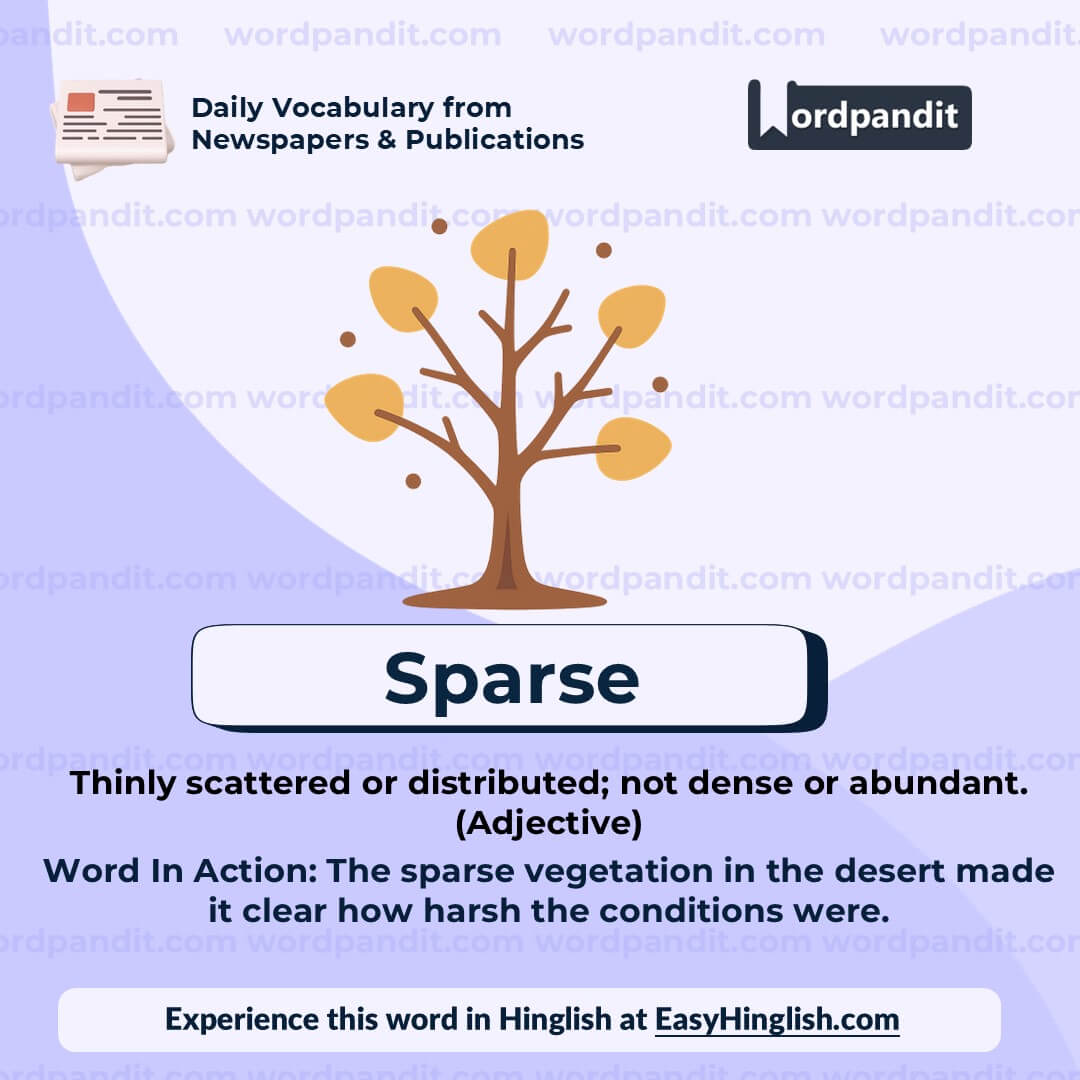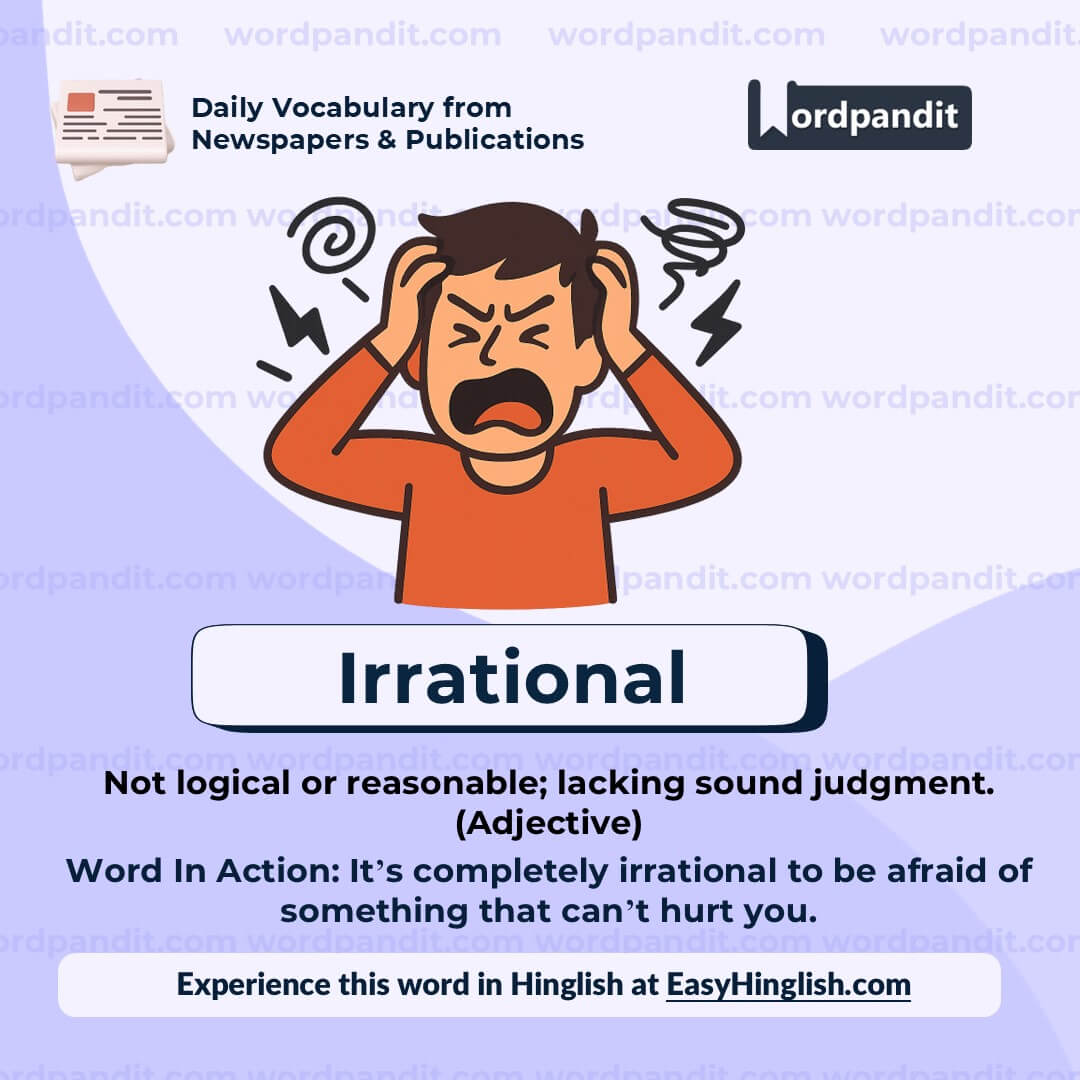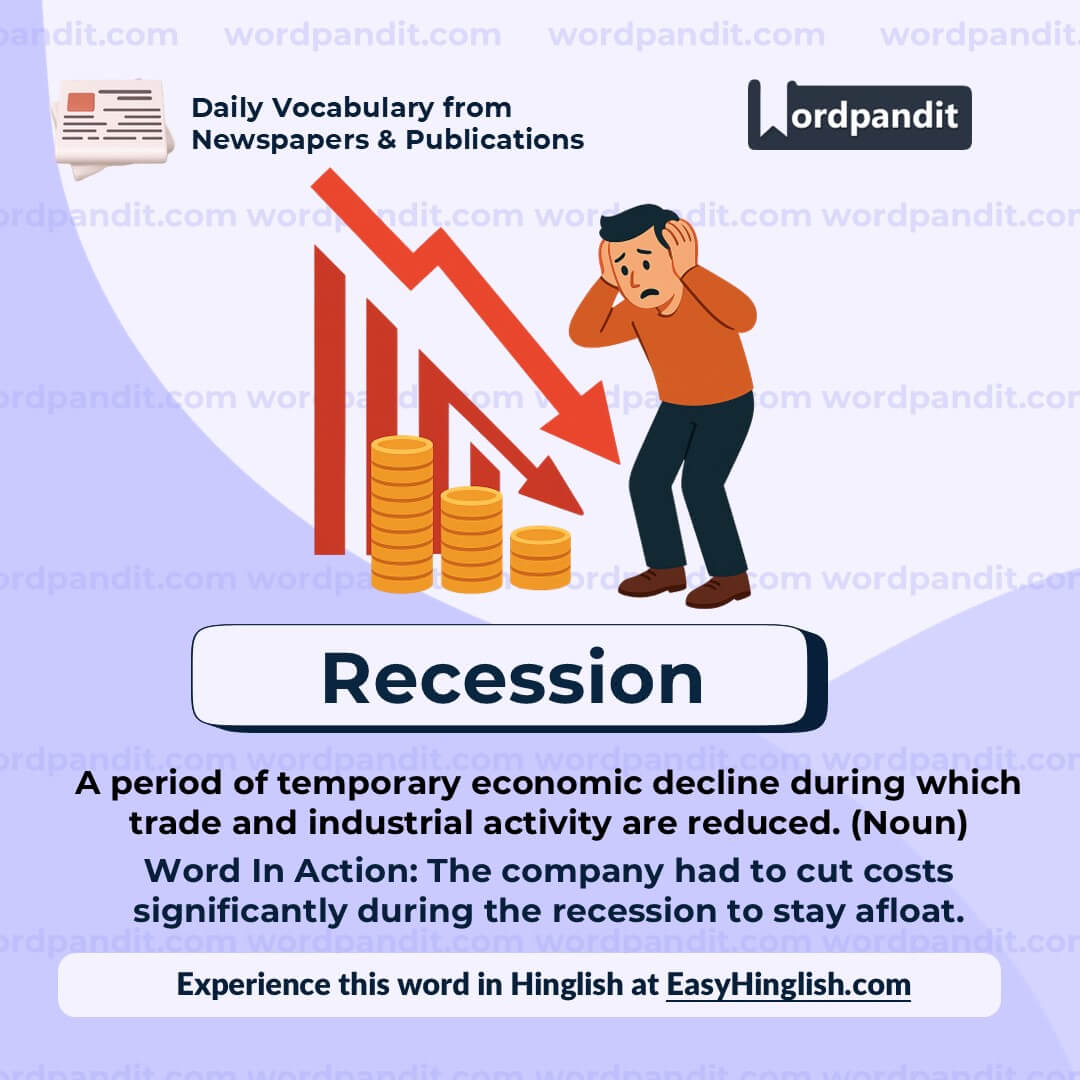Daily Vocabulary from Indian Newspapers and Publications
Welcome to Wordpandit’s Indian Vocabulary Hub
At Wordpandit, we understand the importance of staying rooted in the local context while expanding your language skills. This section focuses on enriching your vocabulary with words and phrases drawn from India’s leading newspapers and publications, ensuring you're learning vocabulary that is practical, relevant, and uniquely Indian.
Why Indian Sources Matter
We believe that the best way to master any language is by immersing yourself in local content. That’s why we carefully curate vocabulary from top Indian publications, including:
- The Hindu
- The Times of India
- The Economic Times
- Hindustan Times
- Live Mint
- The Indian Express
- And many others...
Stay Updated, Stay Relevant
With daily updates from Indian news sources, you’ll be consistently learning words that reflect the trends and shifts in Indian society and culture. Our focus is to provide vocabulary that enhances your understanding of the language in an Indian context.
How Wordpandit Supports Your Goals
Whether you’re preparing for exams, aiming to improve your professional communication, or simply want to stay connected with the latest Indian vocabulary, Wordpandit is here to guide you every step of the way.
Learn with a Practical Approach
Our interactive learning methodology includes real-world examples, engaging activities, and context-specific usage to ensure that every word becomes part of your active vocabulary.
Dive into Indian Vocabulary Today!
Why Choose Wordpandit?
Practical Learning: Focus on words you'll actually encounter in real-world reading, enhancing your comprehension and communication skills.
Diverse Content: From current affairs to scientific breakthroughs, our varied sources expose you to vocabulary across multiple domains.
Effortless Integration: Make Wordpandit a part of your daily routine. Just a few minutes each day can significantly boost your lexicon over time.
Your Path to Vocabulary Mastery
- Visit our Daily Vocabulary section regularly
- Explore new words and their usage in context
- Practice incorporating these words into your own writing and speech
- Track your progress as your vocabulary expands
Start Your Journey Today
Embark on your vocabulary enhancement journey with Wordpandit. By consistently engaging with our daily posts, you'll build a robust vocabulary that serves you well in academic, professional, and personal contexts.
Remember, a word a day keeps linguistic limitations at bay. Make Wordpandit your daily companion in the quest for vocabulary excellence!
WORD-1: Sparse
Context:
"India still has regions where fiber optic cables have never reached and cellular towers remain sparse. SpaceX’s recent partnerships with Airtel and Jio to expand Starlink services across India could be looked at as a fundamental shift in the conceptions of connectivity, national sovereignty, and economic power in the digital age." - The Hindu
Explanatory Paragraph:
The word "sparse" refers to something that exists only in small amounts or is spread out over a large area. In the context of technology or infrastructure, it typically means insufficient or limited in availability. For instance, when cellular towers are sparse, it implies that they are few and far between, leading to poor or inconsistent coverage. The word often conveys a sense of lack or inadequacy due to insufficient quantity or distribution.
Meaning: Thinly scattered or distributed; not dense or plentiful (Adjective)
Pronunciation: spaarss
Difficulty Level: ⭐⭐ Beginner
Etymology: From Latin "sparsus", past participle of "spargere" meaning "to scatter"
Prashant Sir's Notes:
“Sparse” is often used in discussions involving data, population, vegetation, or infrastructure—whenever something is present in limited quantity. A great word to describe absence or inadequacy without directly using "less" or "lack of."
Synonyms & Antonyms:
Synonyms: scattered, scarce, meager, scanty, thin
Antonyms: dense, abundant, plentiful, packed, crowded
Usage Examples:
- The forest was sparse, with trees spread far apart.
- Internet connectivity in remote villages remains sparse even today.
- Her writing was sparse but deeply meaningful.
- Sparse rainfall during the season led to a poor harvest.
Cultural Reference:
"The American West, with its vast landscapes and sparse populations, has often been romanticized in literature and film." - American Frontier Studies
Think About It:
How does the sparseness of resources—like education or internet—impact social and economic progress in rural areas?
Quick Activity:
Look around your room or neighborhood and describe something using the word "sparse." Try using it in two different contexts—physical and abstract.
Memory Tip:
Think of “sparse” as “space”—when something is sparse, there's a lot of empty space around it!
Real-World Application:
"Sparse" is often used in urban planning, environmental science, and technology to describe low density or limited distribution—whether it’s population, network coverage, or natural resources.
WORD-2: Sovereignty
Context:
"India still has regions where fiber optic cables have never reached and cellular towers remain sparse. SpaceX’s recent partnerships with Airtel and Jio to expand Starlink services across India could be looked at as a fundamental shift in the conceptions of connectivity, national sovereignty, and economic power in the digital age." - The Hindu
Explanatory Paragraph:
"Sovereignty" refers to the full right and power of a governing body to govern itself without any interference from outside sources. It is often used in political and legal contexts to describe a nation's independence and authority over its own territory, laws, and decisions. In today's digital world, discussions of sovereignty have expanded to include control over digital infrastructure, data, and internet access.
Meaning: Supreme power or authority; the authority of a state to govern itself (Noun)
Pronunciation: sov-rin-tee
Difficulty Level: ⭐⭐⭐ Intermediate
Etymology: From Old French "sovereinete", based on Latin "superanus" meaning "chief" or "supreme"
Prashant Sir's Notes:
This is a powerful word in geopolitics. While traditionally it referred to national or royal authority, in modern usage it includes digital sovereignty (control over data) and economic sovereignty (independent decision-making). Watch how the context shifts in today's tech-driven world.
Synonyms & Antonyms:
Synonyms: autonomy, independence, self-rule, self-governance
Antonyms: dependence, subjugation, colonialism, occupation
Usage Examples:
- The treaty ensured the country’s sovereignty after decades of foreign control.
- Data sovereignty is becoming a major issue as tech companies expand globally.
- Indigenous communities are fighting for sovereignty over their ancestral lands.
- The war was sparked by a dispute over national sovereignty.
Cultural Reference:
"Sovereignty is not given, it is taken." - Mustafa Kemal Atatürk, Founder of Modern Turkey
Think About It:
In a world dominated by global tech companies, can a nation truly maintain digital sovereignty?
Quick Activity:
Find two examples where sovereignty has been a major theme in international news. Identify whether the context is political, digital, or economic.
Memory Tip:
Think “sovereignty” = “supreme reign” — both suggest full control or power.
Real-World Application:
Sovereignty plays a key role in international relations, cybersecurity debates, data protection policies, and decisions around foreign investments and collaborations.
WORD-3: Irrational
Context:
"On April 2, US President Trump announced the highest, most irrational import tariffs since 1910, declaring this was America’s ‘Liberation Day’. It would be better to call it Recession Day. Or Trade War Day. Or Economic Stupidity Day." - The Times of India
Explanatory Paragraph:
The word "irrational" describes actions, thoughts, or decisions that lack logical reasoning or sound judgment. When someone is acting irrationally, they are often driven by emotions, impulses, or misinformation rather than facts or logic. In economic or political contexts, labeling something as irrational usually criticizes it as reckless, extreme, or not based on a well-thought-out strategy.
Meaning: Not logical or reasonable (Adjective)
Pronunciation: ih-rash-uh-nuhl
Difficulty Level: ⭐⭐ Beginner
Etymology: From Latin "irrationalis", from "in-" (not) + "rationalis" (rational, reasonable)
Prashant Sir's Notes:
“Irrational” is a frequently used critique in debates. It’s not just about madness or being emotional—it's about acting in ways that don’t make sense based on the available evidence or logic. Always pair it with a context to highlight the lack of reason.
Synonyms & Antonyms:
Synonyms: illogical, unreasonable, senseless, absurd, foolish
Antonyms: logical, rational, sensible, reasonable, wise
Usage Examples:
- His fear of elevators is completely irrational—there's no real danger.
- Markets often behave in irrational ways during times of crisis.
- It's irrational to expect different results by repeating the same mistake.
- The policy was criticized for being both harsh and irrational.
Cultural Reference:
"Man is not a rational animal; he is a rationalizing animal." - Robert A. Heinlein, reflecting on the human tendency to justify irrational behavior.
Think About It:
Why do people often make irrational decisions even when all the facts are clearly laid out?
Quick Activity:
List two irrational fears or behaviors you’ve observed in yourself or others. Then try to explain what emotional factors might cause them.
Memory Tip:
“Irrational” = “I” + “rash” — Think of someone rashly making a decision without thinking. It’s not logical!
Real-World Application:
"Irrational" is often used in behavioral economics, psychology, and everyday conversation to describe unpredictable or emotionally driven decisions, from personal relationships to stock market crashes.
WORD-4: Recession
Context:
"On April 2, US President Trump announced the highest, most irrational import tariffs since 1910, declaring this was America’s ‘Liberation Day’. It would be better to call it Recession Day. Or Trade War Day. Or Economic Stupidity Day." - The Times of India
Explanatory Paragraph:
A "recession" refers to a significant decline in economic activity across the economy that lasts for an extended period—typically visible in GDP, employment, income, and consumer spending. It signals a downturn where businesses make less money, jobs become scarce, and people cut back on expenses. The term is frequently used in economic reports, financial journalism, and policy discussions when the economy enters a slowdown phase.
Meaning: A period of temporary economic decline during which trade and industrial activity are reduced (Noun)
Pronunciation: rih-sesh-un
Difficulty Level: ⭐⭐⭐ Intermediate
Etymology: From Latin "recessio" meaning “a going back, retreat,” based on "recedere" – to go back
Prashant Sir's Notes:
“Recession” is a key term in economics and current affairs. Always watch the economic indicators: falling GDP, rising unemployment, lower industrial output—these often point toward a recession. It's also important to distinguish it from a **depression**, which is a deeper and longer economic downturn.
Synonyms & Antonyms:
Synonyms: downturn, slump, slowdown, decline, contraction
Antonyms: boom, growth, expansion, recovery, upturn
Usage Examples:
- The country slipped into a recession after two consecutive quarters of negative growth.
- Many small businesses shut down during the global recession of 2008.
- Unemployment typically rises sharply during a recession.
- Government stimulus packages are often used to pull an economy out of recession.
Cultural Reference:
"The Great Recession" (2007–2009) remains one of the most significant global economic crises since the Great Depression, reshaping banking, policy, and financial regulation worldwide.
Think About It:
Can a country use a recession to re-evaluate and rebuild its economy in more sustainable ways?
Quick Activity:
Search for the most recent recession in any country and list two causes and two effects it had on the population.
Memory Tip:
Think of "recession" as “re-cession”—like taking a step back from progress. The economy is retreating, not advancing.
Real-World Application:
Understanding what a recession is helps individuals make smarter financial decisions—like saving more, reducing debt, and being cautious about big investments during uncertain times.
WORD-5: Priorities
Context:
"The Supreme Court’s decision that judges should publicly declare their assets is welcome and significant, because it prioritises transparency and openness." - The Indian Express
Explanatory Paragraph:
To "prioritise" means to treat something as more important than other things and to give it special attention or precedence. In the context of the sentence, the Supreme Court is giving higher importance to transparency and openness, suggesting these values are essential in judicial accountability. The word is often used in professional, educational, and policy settings to indicate focus or preference in action and decision-making.
Meaning: To arrange or deal with in order of importance; to give special attention to something (Verb)
Pronunciation: pry-oh-ri-tize-iz
Difficulty Level: ⭐⭐ Beginner
Etymology: From Latin "prior" meaning “former, earlier”; modern usage evolved in business and planning contexts
Prashant Sir's Notes:
This verb is a favorite in productivity circles! Whether you're managing time, tasks, or policies, to prioritise is to decide what's most important. Also, take note: "prioritise" is British English, while "prioritize" is the American spelling—both are correct depending on context.
Synonyms & Antonyms:
Synonyms: rank, emphasize, focus on, value, prefer
Antonyms: ignore, neglect, downgrade, overlook, deprioritise
Usage Examples:
- The government prioritises education in its new five-year plan.
- In emergency situations, hospitals prioritise critical cases first.
- She always prioritises her mental health over deadlines.
- A good leader prioritises long-term goals over short-term gains.
Cultural Reference:
In Stephen Covey's bestselling book The 7 Habits of Highly Effective People, one of the key habits is “Put First Things First,” which essentially teaches how to prioritise tasks that matter most over urgent distractions.
Think About It:
What does the way someone prioritises their time say about their values or personality?
Quick Activity:
Make a list of five things you want to do this week. Now, rank them in order of importance. Which one will you prioritise first—and why?
Memory Tip:
Remember: “Prioritise” starts with “prior” — it means deciding what comes *prior* to everything else.
Real-World Application:
Whether managing a company, studying for exams, or setting personal goals, learning to prioritise effectively is key to achieving success and reducing stress.



















